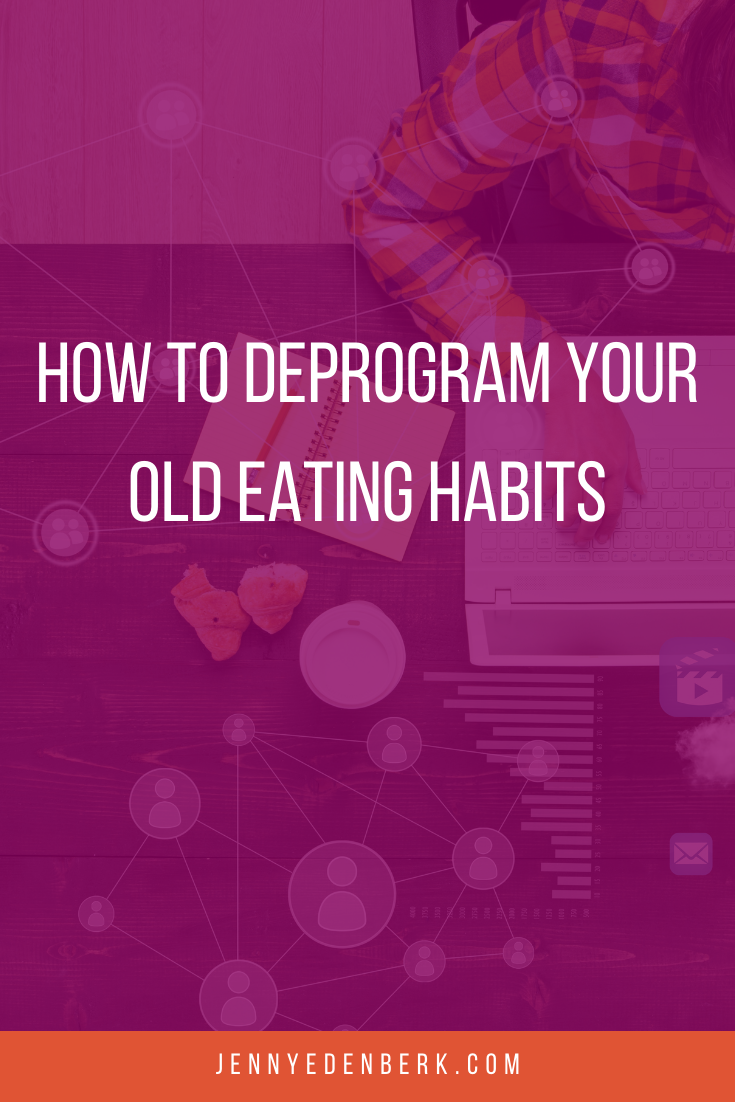How to deprogram your old eating habits
I remember the first time that I left a ton of food on my plate at a restaurant. It was a marvel. Me? An award-winning, card-carrying clean plate club member? Leaving food over?
What was this? It was so foreign. I felt no obligation, desire or compulsion to keep eating, despite that this was my M O for so many years.
The reason this was so shocking and delightful to me was that I had already resigned myself to the fact that I had issues around food, and this was just one of them that I couldn’t change.
Maybe there are some eating habits that you have that feel similar?
Maybe for you it looks like this:
Every day after putting the kids to bed you sneak ice cream from the fridge
You can’t seem to stop yourself from the mindless grazing while cooking dinner
You feel like the meal is just not complete without a dessert
You go to bed with a plan to have a healthy breakfast, yet you wake up and rush out with a donut in one hand and a Dunkin Donuts coffee in the other.
These habits might be so ingrained that it’s as if there is no forethought whatsoever before you start the pattern again.
That’s because these habits form muscle memory that allows you to run through the food script before there is even conscious awareness of it.
There is this really cool part of our brains called the basal ganglia that is found right above the brainstem. The basal ganglia automates behaviors for you so that you can have the mental bandwidth every day to learn new behaviors and skills.
Here’s an example:
Do you remember when you learned how to brush your teeth?
No! You just know how to do it.
You don’t have to walk yourself through relearning how to squeeze the bottle onto the brush, how and where to brush and for how long. You just do it without thought. This is the basal ganglia at work.
However, this same protective and smart AF part of your brain also does this with your eating habits and behaviors.
We learn through repetition, so if there is a particular food habit that you’ve carried with you for many years, there is a reason why it’s so challenging to stop it or replace it with something new. Your brain feels safe and comfortable and familiar doing the habit, EVEN IF it ends up hurting or frustrating you in the long run.
So, how do you reprogram old and even maladaptive eating habits?
Here are a few steps you can take right now:
Bring radical awareness to your habits around food and eating
Bringing awareness DOES NOT mean judging and blaming yourself for these behaviors, but merely being aware of them and acknowledging them. So, if your “food script” is to meander into the kitchen after the kids are asleep, stop yourself in the moment and ask yourself what is behind this particular habit. Is it to decompress? Is it loneliness or boredom? Again, this is a first step and doesn’t mean that you have to change anything just yet. The awareness step alone is huge.
Separate the emotions from the behaviors
Every time I finished my plate even though I was no longer hungry or not even enjoying the meal anymore, I felt terrible about it. Why was I doing this despite being annoyed and ashamed about it? I realized that the emotions themselves were drivers of the behavior. If you feel guilty, ashamed, worried or disgusted by your own habits, your body responds by releasing hormones and chemicals that indicate a stress response in your body. This will keep you in this heightened state, which drives compulsive behavior to begin with. Once I was able to divorce my emotions from the habits themselves, I could think more rationally, calm my nervous system and make decisions that benefitted both the here and now and my future self.
Create a pause or barrier break between you and the eating behavior.
Once you have the awareness, and then can separate out the emotions from the behavior, you can allow for a pause, a break, if you will, to deprogram the habit. If your “script” is to head downstairs for sneaky, stealth-ice cream-eating in the evening, take 10 minutes first to do something else to calm yourself. Watch a show, read a chapter of a book, take a bath, take an evening stroll. Give yourself full permission to follow the steps of your script AFTER you have taken this break. The idea here again is not to force yourself to not eat, but give your brain and nervous system a chance to move from a stress response to a relaxed response.
This technique also helps foil your regular eating habit because it inserts a new routine into the habit which is less familiar to your brain. With repetition, the new behavior can crowd out the old one.
Become an intuitive eater
One of the reasons why we have disordered eating or continue to act impulsively with food, is because people who have struggled with food/weight/eating have imposed food rules on themselves for so long. These rules are steeped in the fact that we are not to be trusted on our own. The sooner you reject that notion and start understanding and trusting your own body, learning about it and respecting its communication with you, the energy around the compulsion fades. The reason I felt so compelled to finish my plate is because I learned over time that if I didn’t finish my plate, I might be hungry later because I was always restricting my calories and what I was “allowed” to eat. Once this behemoth is removed from the equation, food decisions become far less scary and tinged with morality. I left food on my plate because my body gave me the signals that I was done and I started listening to those cues more clearly, without my own inner food police ringing the siren constantly, making me confused and putting me in a scarcity mindset.
These food habit shifts take time. Anyone who sells you a quick fix is simply not being forthcoming with you. Eating is not just physical. We eat with our emotions, our psychology, our beliefs, our history and culture and also mirror the food habits of the people around us.
Deprogramming food habits takes time but is incredibly freeing and rewarding. Most importantly, it creates space and room in your brain to focus on all the other things in your life that make you happy and give you satisfaction.
Deprogramming food habits is a core foundation of my latest 1:1 / group program called Replenish.
Want to learn more?
Set up a free “get to know you” call now so you can learn more and I’ll send you the video (plus slides) of my popular workshop, “Stop Emotional Eating in its Tracks”
Set up your call here.

